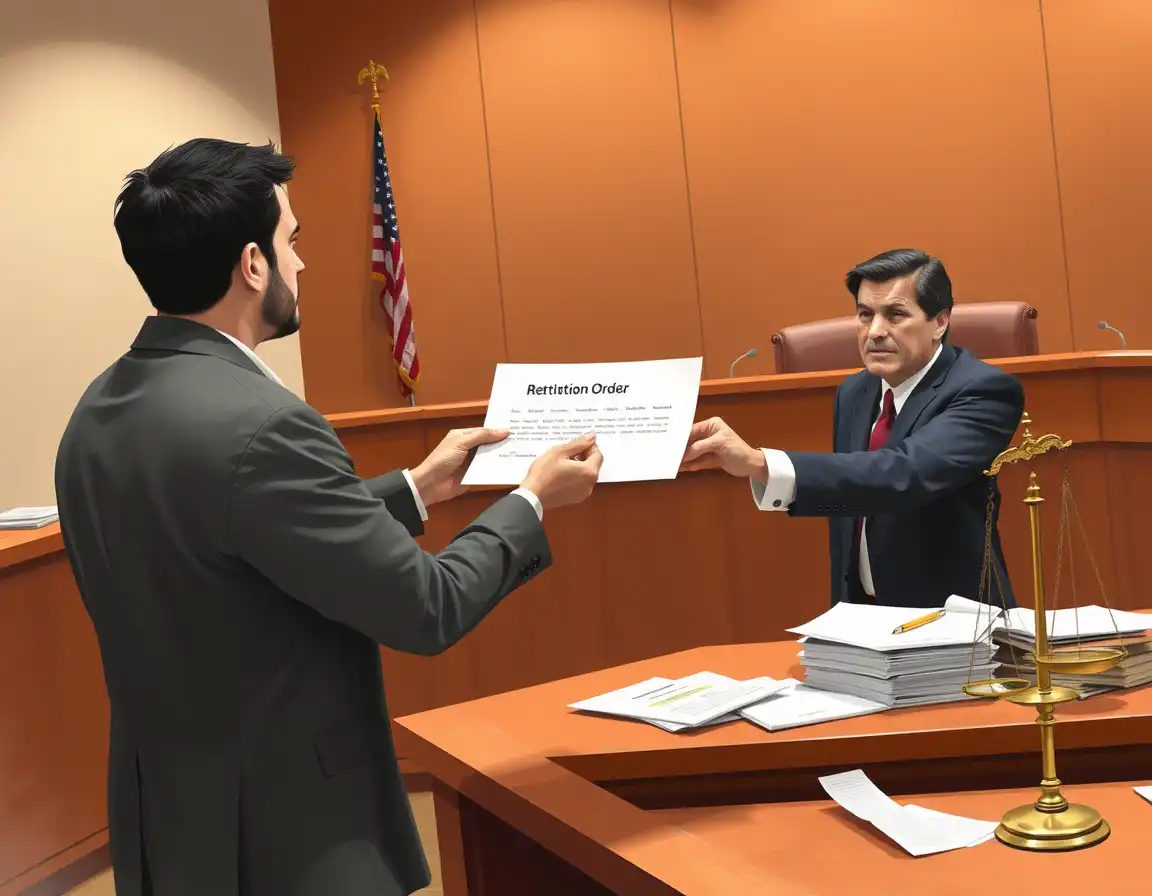In the legal world, restitution generally means a process ordered by a court in which victims receive compensation for losses sustained as a result of a crime or wrongdoing. It relates to the restoration of justice, particularly in a financial context for damages of a criminal or civil nature affecting either property or emotion. But then, what is restitution, and how does it work?
Whether you are a victim trying to recover or a defendant facing an order to pay restitution, knowing the obligations and the procedure for restitution payment is indispensable. Let us consider what restitution otherwise involves, who the parties are entitled, and what happens if restitution is not paid.
What Is Restitution in Law?
Restitution, in legal terms, considers the forced payment of compensation by the defendant to the victim for losses caused either by crime or civil wrongdoing. Unlike fine payments, which go to the government, restitution payments go directly to the victim to “make him whole.”
The meaning of restitution may vary slightly according to the law. In criminal law, it typically means the reimbursement of a victim for losses out-of-pocket. However, in tort law, it may mean the restoration of property or the reversal of unjust enrichment. The general emphasis, however, is on restoring the financial position of the victim as it existed before the wrongdoing occurred.
Who Is Eligible to Receive Restitution?
Restitution is intended for persons or organizations and businesses who have been injured in body as a result of commission of a crime by a defendant or have suffered financial loss. Included here is a scenario where an individual has fallen victim to an offense such as theft, fraud, assault, damage to property, and anything that could carry similar aspects.
Eligibility may extend to family members or survivors of deceased victims, which again depends on its definition and court ruling. Some states also allow for governmental entities or even insurance companies that have reimbursed the victim from claiming restitution.
Restitution vs. Damages: What’s the Difference?
At first sight, restitution damages and general legal damages might appear identical, but they serve different purposes in law. Compensation is, in fact, the aim of both, but they differ in their origin and extent. Restitution applies versus damages for distinction:
- Generally, restitution would be ordered in a criminal proceeding in favor of a particular victim. It concerns the actual loss sustained because of the crime.
- Damages, on the other hand, are usually found in civil lawsuits and may constitute damages for pain and suffering and for punitive damages as well as for loss of income, future loss that is not simply loss in monetary terms.
This difference is crucial in sorting out the occasions when you would pursue restitution as opposed to entering into a civil suit for damages.
How Restitution Payments Work?
The defendant is supposed to pay the amount spelled out in the judgment once a judge issues an order for restitution payments. Generally, restitution payments occur in installments unless the defendant can pay in full. Generally, the courts set up installment payment plans to pay large amounts, sometimes as low as $100 per month.
Eventually, they will make payments by a court program or victim compensation board to deposit funds to the individual who has been victimized. This allows the court to hold hearings to monitor compliance, and nonpayment could result in serious consequences.
How Long Do You Have to Pay Back Restitution?
One of the frequently asked questions is, How long do I have to pay back restitution? In brief, factors include the payment plan set forth by the court, the total amount owed, and the defendant’s capability of resuming payment.
Restitution orders are normally given during the period of probation or parole, but in the majority of jurisdictions, the responsibility exists even beyond the end of the sentence-until the entire amount due has been paid. In some instances, unpaid restitution can become a civil judgment and can remain on record for seven to ten years or longer.
Restitution Hearing: What to Expect
Restitution hearing means a legal proceeding to establish what a defendant should pay the victim. If at the time of sentencing the extent of loss is not readily ascertainable, the judge will set this hearing to examine the financial consequences for the victim.
The hearing is a time during which either the prosecution or the defense may produce evidence like receipts, medical bills, repairing estimates, or expert witness testimony. Afterwards, the judge will use the evidence to decide the amount of restitution payment. This result is legally binding.
In the hearing, the fairness or necessity of certain costs may also be disputed between the sides. There can be issues of financial distress by the defendant and the victim insisting on the long-term effects of the crime. The discussions enable the judge to strike the balance between justice and practicality in arriving to the final amount.
What Happens If Restitution Is Not Paid?
Failure to make restitution payments can create several legal repercussions. Courts take these obligations very seriously because they are meant to directly benefit victims. Common penalties for those who do not pay go as follows:
- Probation revocation
- Wage garnishment or tax refund interception
- Civil liens on property or assets
- Amendment of extended payment terms
- Contempt of court charges
In the most extreme cases, a defendant may be jailed when he has willfully refused payment, this is rare and only for cases where a defendant had both the ability and the intent to pay.
How Restitution Supports Crime Victims?
Restitution is only part of those few ways in the state which consider the financial recuperation of crime victims. No sum could take the place of emotional trauma for the victim, but compensation serves as a means to, at least in part, assist them in moving on and restoring some stability.
Restitution is not only for these direct costs, such as repaying medical bills or recovering stolen property. It is also a recognition by the court of the injury suffered by the victims. Many victims find this form of redo as closing and satisfying.
Final Verdict
Restitution hearings long behind making several decrees on the continued paying of restitution to long-term payment of restitution; it proves that this particular place is very much integrated within the justice system. Whether you are the victim seeking damages or the defendant with restitution obligations to meet, it is thus wise to know about your rights and responsibilities.
If looking for help to navigate restitution law, consider hiring a lawyer who specifically focuses on victim services or criminal defense. Justice is not just punishment; it is about making things right.





